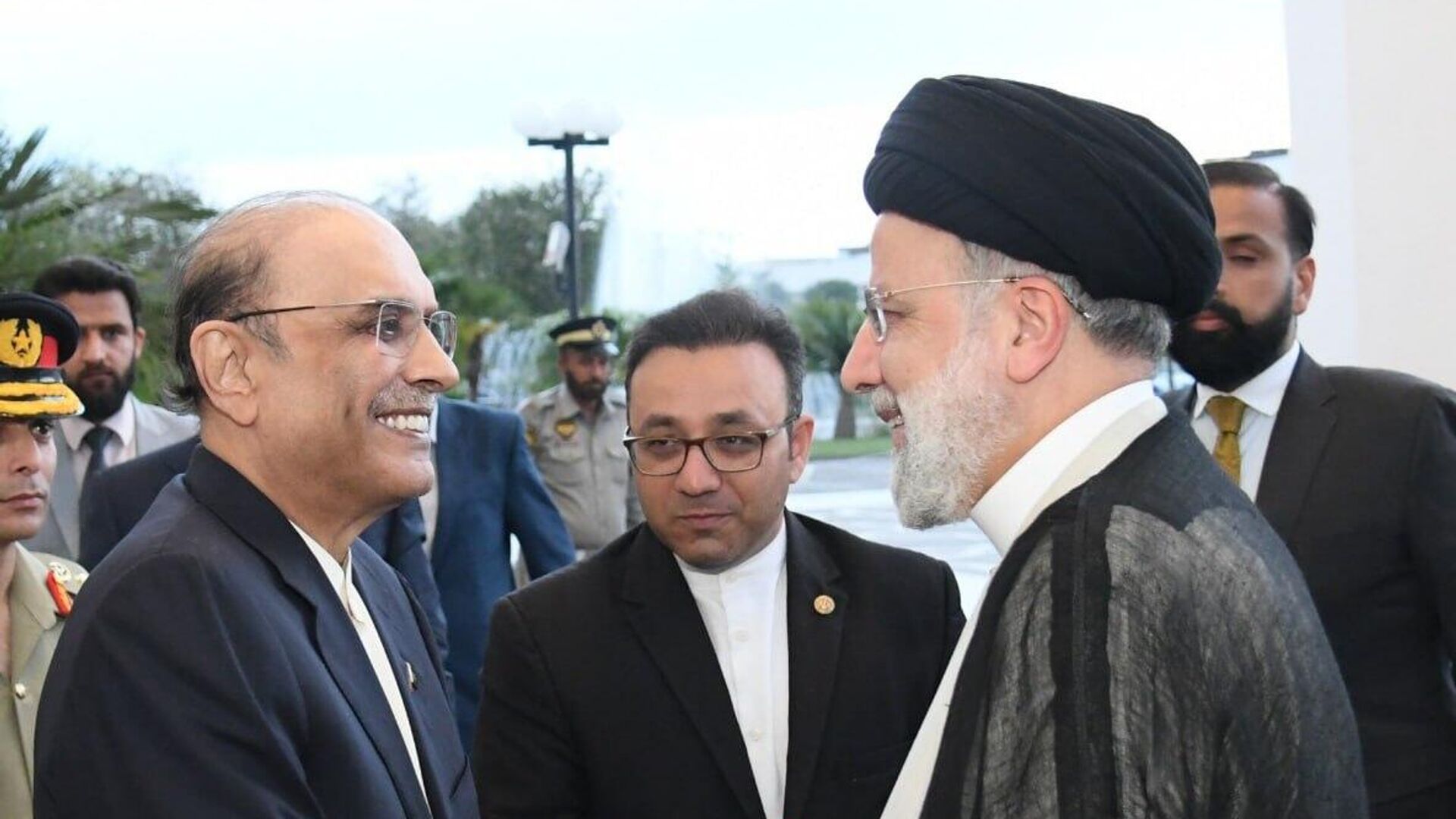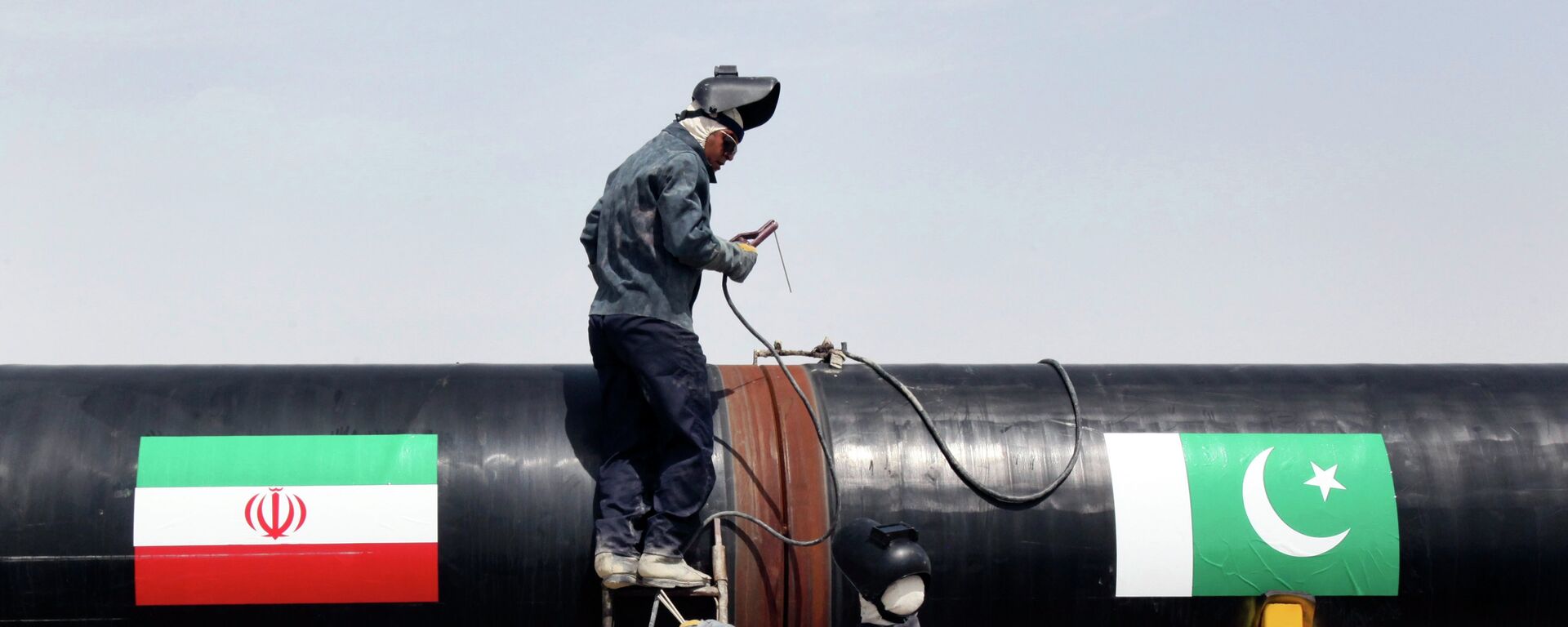https://sputniknews.in/20240424/pakistans-shifting-alliances-embracing-asia-over-the-west-7204167.html
Pakistan's Shifting Alliances: Embracing Asia Over the West
Pakistan's Shifting Alliances: Embracing Asia Over the West
Sputnik India
The recent three-day official visit of the Iranian President to Pakistan on 22-24 April has raised concerns in the West. Sputnik India aims to analyse developments in South Asia in the light of this visit, with a particular focus on the new Pak-Iran relationship and the counter-perspective of the Western reaction.
2024-04-24T18:41+0530
2024-04-24T18:41+0530
2024-04-24T18:41+0530
sputnik opinion
ebrahim raisi
shehbaz sharif
pakistan
iran
islamabad
india
china
joe biden
https://cdn1.img.sputniknews.in/img/07e8/04/16/7196399_0:62:1184:728_1920x0_80_0_0_0b750eaa785cc89eb3485ed99c81ec7e.jpg
Iranian President Ebrahim Raisi made a significant visit to Pakistan on Monday in a bid to improve relations following recent military incidents. The visit comes amid ongoing tensions in the Middle East, marked by air strikes between Iran and Israel. Despite warnings from the US, Islamabad and Tehran remain committed to pushing ahead with the Iran-Pakistan gas pipeline project.During his visit, President Raisi met with the Prime Minister, the President, the Chief of Army Staff and other senior delegates and diplomats. The two countries also signed eight agreements and memorandums of understanding to promote cooperation in various fields.Additionally, PM Shehbaz Sharif and President Raisi jointly inaugurated the newly constructed section of Islamabad's 11th Avenue, which has been renamed Iran Avenue.In official meetings between Pakistan's Prime Minister Shahbaz Sharif and Iran's President Ebrahim Raisi, both leaders reaffirmed their commitment to completing Pakistan's section of the pipeline despite possible economic sanctions by the US.Understanding the Significance of the Recent Pak-Iran RelationsIt was the first official visit by a head of state after the general elections in Pakistan in 2024, and the first visit by an Iranian president to Pakistan in a long time, despite recent tensions over attacks on each other's territory.However, despite some commercial agreements, Pakistan and Iran have a history of strained relations. One of their major agreements, a stalled gas supply deal signed in 2010, was to build a pipeline from Iran's South Fars gas field to Pakistan's Balochistan and Sindh provinces."Despite strong lobbying and pressure from the U.S. and influential groups, Pakistan is determined to pursue normalized relations with Iran, recognizing the significance of its geographic proximity. Although bridging the gap between Iran and Pakistan will take time, there is optimism for future improvement," Professor Javaid expressed."The recently concluded visit of the Iranian President should be taken as only a diplomatic exercise to discuss anti-terrorism mechanisms and joint efforts to cope with the cross border terrorism, batter trade and last but not least, expansion of border markets promoting bilateral trade and economic integration. No serious pledge for the commencement of Pak-Iran Gas Pipeline thoroughly discussed," he added.Nevertheless, we know that Pakistan has traditionally been closer to Saudi Arabia and the United States because of its dependence on aid, loans and financial tranches.Is Pakistan Ready to Drive Away From Western Dependency?Based on an analysis of current geo-political and geo-economic developments, and amidst the growing influence of Asia, Pakistan is seeking alternatives to reduce dependence, promote regional connectivity and pursue a balanced approach."Frankly speaking, Pakistan does not have any extraordinary strategic cushion to maneuver its foreign, economic, or military policy mainly focusing towards Iran on the cost of its relationships with the US and the West alike. Therefore, there would not be any substantial increase in mutual trade volumes, joint ventures projects, agriculture, industrial or energy cooperation between two countries," pundit further said.However, due to its fragile economic situation and strained relations with its neighbours, especially India and Afghanistan, Pakistan is struggling to develop an independent foreign policy towards emerging powers such as China, Iran or Russia."Now, Pakistan is much focused on a multilateral approach, emphasizing the importance of investment and positive relations to address its economic challenges. Previously inclined towards a Western alignment, Pakistan is now embracing a multilateral approach to build strong ties with neighboring countries, acknowledging the inevitability of its geographic position. Pakistan is actively fostering positive relationships with China, Russia, and Iran to contribute to a more balanced global order. However, Pakistan has recognized the importance of collaborating with regional states rather than relying solely on Western countries," Professor Faisal Javaid added.In short, the meetings between the Iranian president and Pakistani officials could be a pivotal moment if both countries proceed with the gas pipeline project despite fears of sanctions and pressure from the US and the West.
https://sputniknews.in/20240423/pakistan-iran-to-proceed-with-pipeline-despite-american-threats-7200298.html
pakistan
iran
islamabad
india
china
Sputnik India
feedback.hindi@sputniknews.com
+74956456601
MIA „Rossiya Segodnya“
2024
Muhammad Sharif
https://cdn1.img.sputniknews.in/img/07e7/0b/05/5257054_0:0:443:444_100x100_80_0_0_b8bd2af32be62a6eecdb4a84c7fd978f.jpg
Muhammad Sharif
https://cdn1.img.sputniknews.in/img/07e7/0b/05/5257054_0:0:443:444_100x100_80_0_0_b8bd2af32be62a6eecdb4a84c7fd978f.jpg
News
en_IN
Sputnik India
feedback.hindi@sputniknews.com
+74956456601
MIA „Rossiya Segodnya“
Sputnik India
feedback.hindi@sputniknews.com
+74956456601
MIA „Rossiya Segodnya“
Muhammad Sharif
https://cdn1.img.sputniknews.in/img/07e7/0b/05/5257054_0:0:443:444_100x100_80_0_0_b8bd2af32be62a6eecdb4a84c7fd978f.jpg
iran, pakistan, western nedia, south asia news
iran, pakistan, western nedia, south asia news
Pakistan's Shifting Alliances: Embracing Asia Over the West
The recent three-day official visit of the Iranian President to Pakistan on 22-24 April has raised concerns in the West. Sputnik India aims to analyse developments in South Asia in the light of this visit, with a particular focus on the new Pak-Iran relationship and the counter-perspective of the Western reaction.
Iranian President Ebrahim Raisi made a significant visit to Pakistan on Monday in a bid to improve relations following recent military incidents. The visit comes amid ongoing tensions in the Middle East, marked by air strikes between Iran and Israel. Despite warnings from the US, Islamabad and Tehran remain committed to pushing ahead with the Iran-Pakistan gas pipeline project.
During his visit, President Raisi met with the Prime Minister, the President, the Chief of Army Staff and other senior delegates and diplomats. The two countries also signed eight agreements and memorandums of understanding to promote cooperation in various fields.
Additionally, PM
Shehbaz Sharif and President Raisi jointly inaugurated the newly constructed section of Islamabad's 11th Avenue, which has been renamed Iran Avenue.
In official meetings between Pakistan's Prime Minister Shahbaz Sharif and Iran's President Ebrahim Raisi, both leaders reaffirmed their commitment to completing
Pakistan's section of the pipeline despite possible economic sanctions by the US.
Understanding the Significance of the Recent Pak-Iran Relations
It was the first official visit by a head of state after the general elections in Pakistan in 2024, and the first visit by an Iranian president to Pakistan in a long time, despite recent tensions over attacks on each other's territory.
However, despite some commercial agreements, Pakistan and Iran have a history of strained relations. One of their major agreements, a stalled gas supply deal signed in 2010, was to build a pipeline from Iran's South Fars gas field to Pakistan's
Balochistan and Sindh provinces.
"Despite being a nuclear power with a strong military presence, Pakistan faces economic fragility. While both nations have signed various agreements and formed economic partnerships, Pakistan's delicate economic situation leaves it vulnerable to sanctions. Nevertheless, Pakistan is committed to maintaining a balanced approach in its relationships," Professor Faisal Javaid, a think tanker, D.Director of ORIC at Federal Urdu University Karachi & a Geo-Political analyst, told Sputnik.
"Despite strong lobbying and pressure from the U.S. and influential groups, Pakistan is determined to pursue normalized relations with Iran, recognizing the significance of its geographic proximity. Although bridging the gap between Iran and Pakistan will take time, there is optimism for future improvement," Professor Javaid expressed.
"The Joe Biden administration has already given warning to the government of Pakistan to stay away from Iran-Pakistan Gas pipeline failing to which it would confront severe sanctions. Additionally, Pakistan’s any diplomatic effort for the further strengthening of socio-economic, investment, joint venture, connectivity and energy cooperation with the Iranian side would be fatal for Pak-US bilateral relations. This message was loud and clear and it has spillover repercussions," Dr Mehmood Ul Hassan Khan, a regional expert, told Sputnik India.
"The recently concluded visit of the Iranian President should be taken as only a diplomatic exercise to discuss anti-terrorism mechanisms and joint efforts to cope with the cross border terrorism, batter trade and last but not least, expansion of border markets promoting bilateral trade and economic integration. No serious pledge for the commencement of Pak-Iran Gas Pipeline thoroughly discussed," he added.
Nevertheless, we know that Pakistan has traditionally been closer to
Saudi Arabia and the United States because of its dependence on aid, loans and financial tranches.
Is Pakistan Ready to Drive Away From Western Dependency?
Based on an analysis of current geo-political and geo-economic developments, and amidst the growing influence of Asia, Pakistan is seeking alternatives to reduce dependence, promote regional connectivity and pursue a balanced approach.
"Pakistan’s core interests may be pursued and protected by following a pragmatic, innovative and balanced foreign policy consisting of matching ties and befitting propositions with both the blocs i.e. Asia and the West. Its continuation of trustworthy relationship and completion of the CPEC Phase-II with China, outreach to Indonesia, Malaysia, Vietnam and ASEAN would be an ideal combination negating socio-economic, geopolitical and geostrategic pressures of the US and the West," Dr Mehmood Ul Hassan Khan expressed to Sputnik India.
"Frankly speaking, Pakistan does not have any extraordinary strategic cushion to maneuver its foreign, economic, or military policy mainly focusing towards Iran on the cost of its relationships with the US and the West alike. Therefore, there would not be any substantial increase in mutual trade volumes, joint ventures projects, agriculture, industrial or energy cooperation between two countries," pundit further said.
However, due to its fragile economic situation and strained relations with its neighbours, especially India and
Afghanistan, Pakistan is struggling to develop an independent foreign policy towards emerging powers such as China, Iran or
Russia.
"The government of Pakistan has been striving hard to diversify its foreign policy and shifting from its the long decades doctrine of geopolitics to geo-economy and redefining of its strategic priorities towards Asia including Iran and Saudi Arabia, Middle East, China, ASEAN (Indonesia, Malaysia, Vietnam) Central Asia (Uzbekistan, Kazakhstan, Turkmenistan), Azerbaijan and last but not least African continent," Dr Mehmood Ul Hassan, an expert concluded.
"Now, Pakistan is much focused on a multilateral approach, emphasizing the importance of investment and positive relations to address its economic challenges. Previously inclined towards a Western alignment, Pakistan is now embracing a multilateral approach to build strong ties with neighboring countries, acknowledging the inevitability of its geographic position. Pakistan is actively fostering positive relationships with China, Russia, and Iran to contribute to a more balanced global order. However, Pakistan has recognized the importance of collaborating with regional states rather than relying solely on Western countries," Professor Faisal Javaid added.
In short, the meetings between the Iranian president and Pakistani officials could be a pivotal moment if both countries proceed with the gas pipeline project despite fears of sanctions and pressure from the US and the West.



